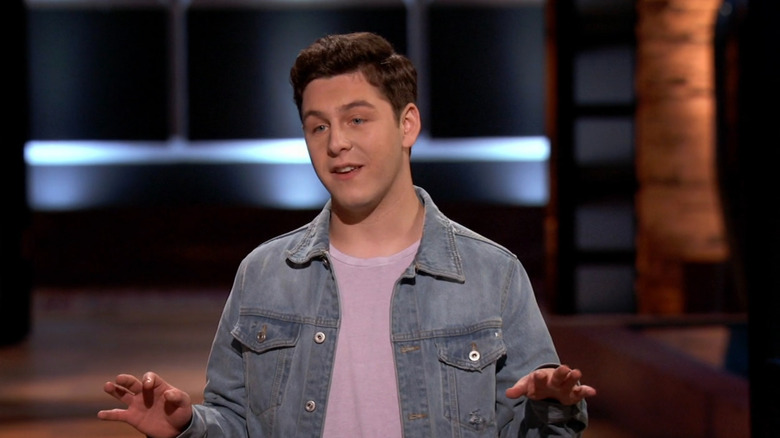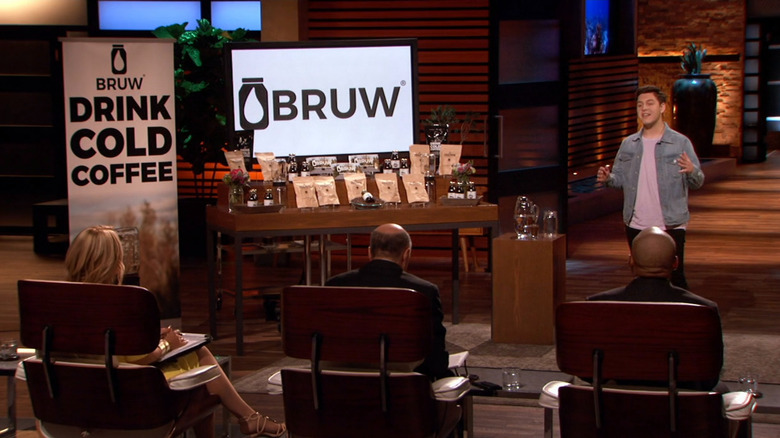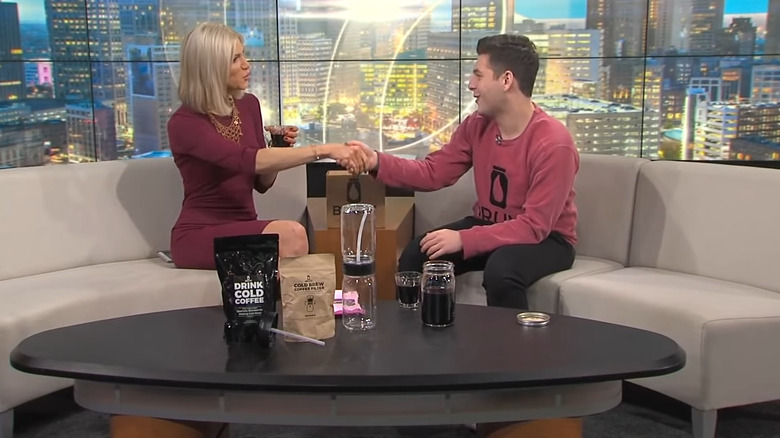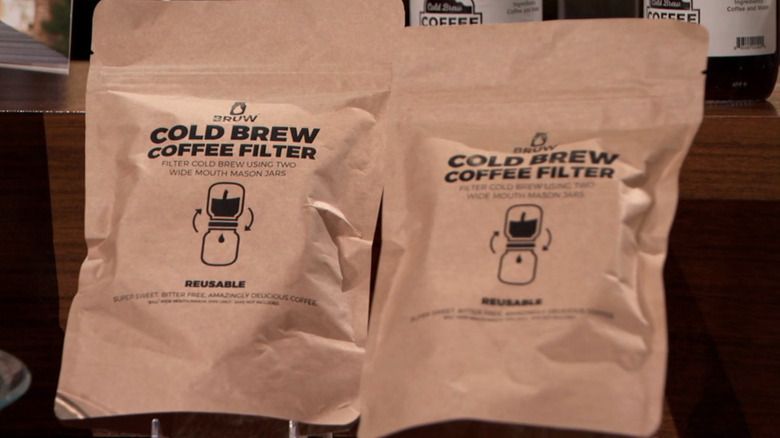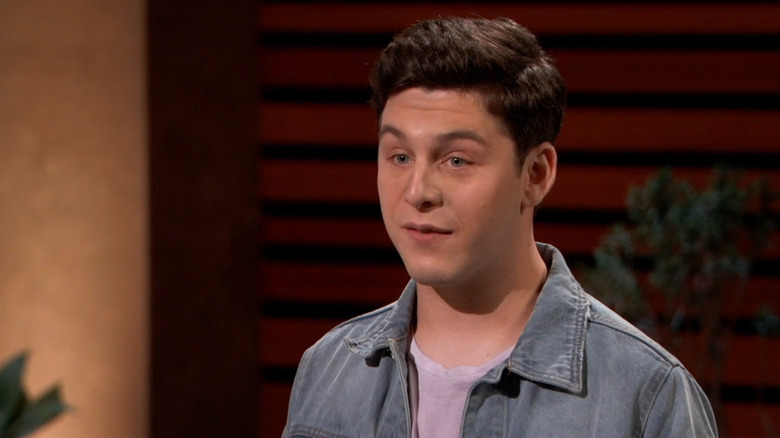Whatever Happened To Bruw After Shark Tank?
Caffeine aficionados have grown a fondness for cold brew beverages in recent years, but making them at home has not always been a viable option given the time and costs. Thankfully, Michigan-based entrepreneur Joe Feber has a solution at hand with his invention, the Bruw filter. The product employs a double-sided mason jar lid that has a special filter in its middle. Fill one mason jar with coffee and water and let it sit in your fridge overnight. The next day, attach the mason jar full of coffee and water to another empty mason jar using the lid and flip it. The coffee and water filter into the empty mason jar, giving you an instant cold brew.
Bruw came about while Feber was only 15. Having been an avid coffee drinker throughout his high school years, Feber wanted to find a cost-effective manner of making cold brew coffee, rather than relying on other systems that can cost upwards of $400. He researched and tested out various solutions, but failed to find an approach that was free of unnecessary mess and hassle. Thinking fast, he created a prototype for Bruw with a piece of screen door fit in between two mason jar lids. From there, he launched a successful Kickstarter campaign for Bruw in November 2015 that managed to raise over $10,000. Feber found himself featured on a number of local programs with his product, which helped drive sales and develop key partnerships.
While in his first year of studying business at Babson, Feber received the opportunity of a lifetime when he was selected to appear on Season 10 of "Shark Tank," a show he'd been a fan of since the age of 8.
What happened to Bruw on Shark Tank?
Entering the "Shark Tank," Max Feber is looking to get $50,000 in exchange for 25% of Bruw. Feber explains that there's a growing market for cold brew, as companies such as Peet's Coffee and Starbucks have been heavily implementing cold brew options into their lineup at a higher price than iced coffee. While other cold brew coffee filters exist, they come at a much higher price for regular consumers.
The filter is Bruw's best-selling item and goes for between $15 and $20. It costs $4 to make, but he aims to bring it down to $1.50 as the business continues to scale. Additionally, he hopes to move from selling strictly online to selling in major retail locations within the next year. Last year, the company made $50,000 in sales and is projecting sales of $100,000 by year's end. Feber sees Bruw as a good impulse purchase to place by registers and wants to eventually bring the price down to around $5. He explains that he's been a fan of "Shark Tank" since childhood and has taken the lessons he's learned from the show to apply to his own operation. The investors are flattered to hear this.
Kevin O'Leary makes the first offer of $50,000 for 50% of Bruw, believing Feber won't be able to commit to the rigorous daily needs of a CEO given his commitment to school. Daymond John sees licensing potential with one of the major coffee brands and proposes paying $50,000 for 30%. Mark Cuban is interested, but only if Feber continues focusing on keeping his margins high and working on advertising. He offers the $50,000 for 30% and Feber takes the deal.
Bruw after Shark Tank
Max Feber and Mark Cuban's deal for Bruw would officially close in October 2018 following the typical "Shark Tank" aftermath procedure of due diligence. The episode itself aired on January 6, 2019. Like several "Shark Tank" companies before it, Bruw experienced the "Shark Tank" effect, which is a surge in sales and online traffic. The company apparently made more in the two days after its segment aired than in its entire lifespan. It was the only Mark Cuban company to make more in revenue the day following its broadcast than the day of, with Feber even allowing potential buyers to call or FaceTime him through his personal phone to answer any questions.
Now with a powerful investor like Mark Cuban on his side, Feber sought to bring more attention to Bruw. Speaking with WXYZ-TV Detroit, Feber shared the business' next steps, saying, "We're taking his money, we're investing it in marketing. So we're going to try and grow like crazy, we just want more and more people to know about us and more people to know that making cold brew at home can be super simple with Bruw." Along with growing their marketing reach, Feber also stated that the team was looking into expanding their product line with other cold brew-specific items, such as flavored coffee packets.
Why did Bruw go out of business?
Despite the promising outlook of Bruw's future, the company wouldn't last much longer after its "Shark Tank" appearance. In May 2020, Bruw was acquired by the Kevin O'Leary-funded "Shark Tank" venture, Snarky Tea.
Ultimately, the decision came down to Bruw founder Max Feber's lack of motivation for running the business any longer. In an interview with Babson Magazine, Feber explained, "I realized I began to wake up every day exhausted by the business. I didn't feel the same energy as in the beginning. The thought of fundraising or significantly scaling BRUW was no longer exciting. I do eventually want to run a company and do these things, but I don't think Bruw is the right venture for this time in my life." Those close to Feber suggested that he sell the company and he went on a hunt to find the right partner.
After an exhaustive search, he came across Jenni-Lyn Williams of SnarkyTea through a Facebook group and proposed that a cold brew tea filter would make a great fit for her lineup. A Kickstarter was launched in April 2020 that brought in over $11,000 on a $1,000 goal. While listed on online platforms such as SnarkyTea's website and Amazon, the filter is currently out of stock.
What's next for Bruw's founder?
During Bruw's "Shark Tank" segment, Lori Greiner predicted that Max Feber's business-savvy nature would lead him to a more successful venture down the line. In this case, it appears the Shark was right on the money. Even with Bruw's promising signs of growth, its founder's high ambitions were ultimately stronger. When describing to Babson Magazine his plans after selling Bruw, the entrepreneur stated, "I know for sure that I will be starting another company at some point, I have no doubt."
Since that time, his rich knowledge of the business space has brought Feber a wealth of opportunities. He has worked in major managerial and directorial positions for companies such as Impacked, Fountain, and Gay Water. In September 2022, Feber's thirst to start another venture was quenched with the creation of Bellweather, a platform made for grassroots community organizers to strengthen their efforts. The startup was recently accepted into the venture capital residency, Antler, for its fall 2023 session. Additionally, he is continuing his education through a part-time program at the New York University Stern School of Business.
